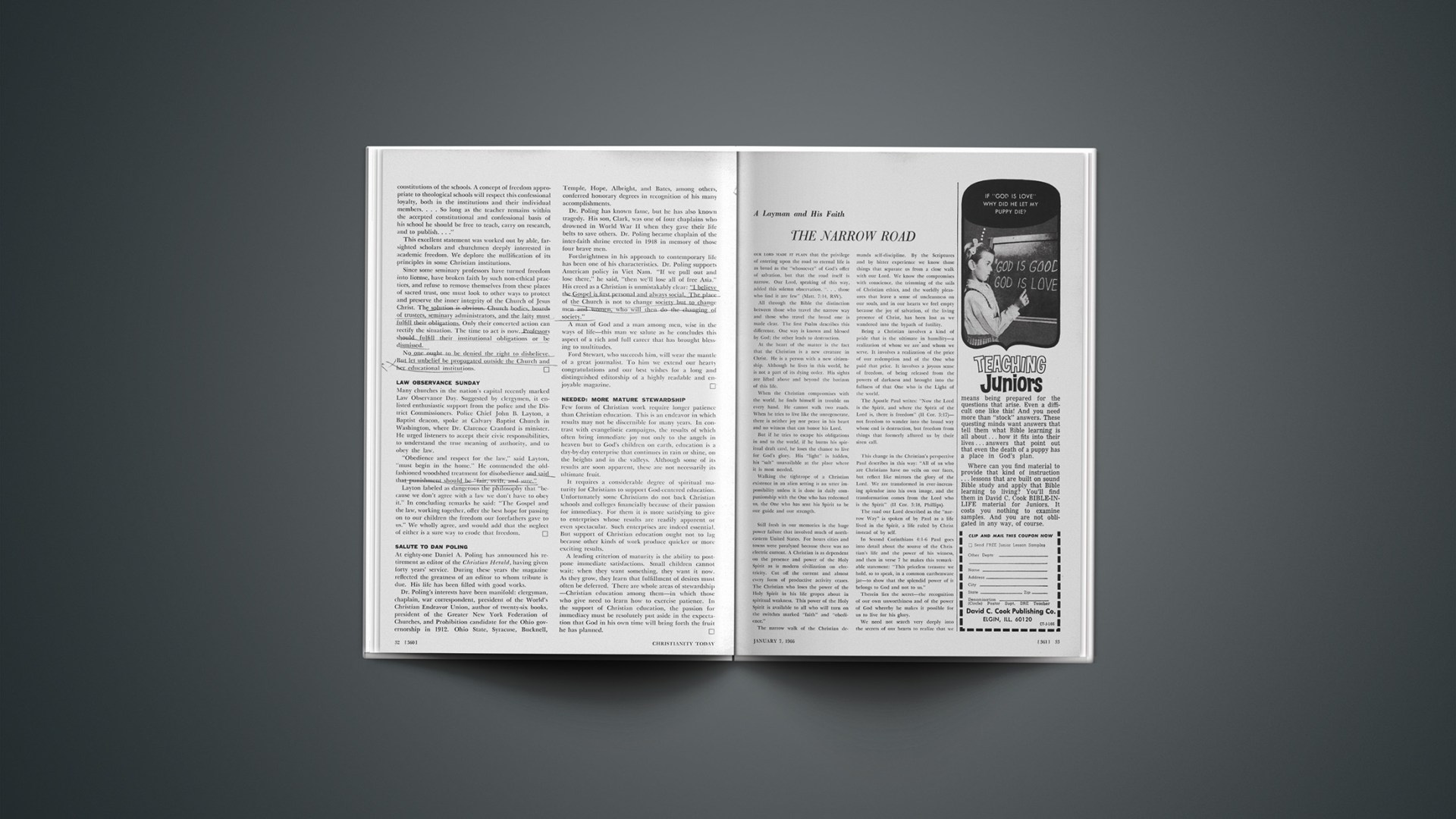Our lord made it plain that the privilege of entering upon the road to eternal life is as broad as the “whosoever” of God’s offer of salvation, but that the road itself is narrow. Our Lord, speaking of this way, added this solemn observation, “… those who find it are few” (Matt. 7:14, RSV).
All through the Bible the distinction between those who travel the narrow way and those who travel the broad one is made clear. The first Psalm describes this difference. One way is known and blessed by God; the other leads to destruction.
At the heart of the matter is the fact that the Christian is a new creature in Christ. He is a person with a new citizenship. Although he lives in this world, he is not a part of its dying order. His sights are lifted above and beyond the horizon of this life.
When the Christian compromises with the world, he finds himself in trouble on every hand. He cannot walk two roads. When he tries to live like the unregenerate, there is neither joy nor peace in his heart and no witness that can honor his Lord.
But if he tries to escape his obligations in and to the world, if he burns his spiritual draft card, he loses the chance to live for God’s glory. His “light” is hidden, his “salt” unavailable at the place where it is most needed.
Walking the tightrope of a Christian existence in an alien setting is an utter impossibility unless it is done in daily companionship with the One who has redeemed us, the One who has sent his Spirit to be our guide and our strength.
Still fresh in our memories is the huge power failure that involved much of north-eastern United States. For hours cities and towns were paralyzed because there was no electric current. A Christian is as dependent on the presence and power of the Holy Spirit as is modern civilization on electricity. Cut off the current and almost every form of productive activity ceases. The Christian who loses the power of the Holy Spirit in his life gropes about in spiritual weakness. This power of the Holy Spirit is available to all who will turn on the switches marked “faith” and “obedience.”
The narrow walk of the Christian demands self-discipline. By the Scriptures and by bitter experience we know those things that separate us from a close walk with our Lord. We know the compromises with conscience, the trimming of the sails of Christian ethics, and the worldly pleasures that leave a sense of uncleanness on our souls, and in our hearts we feel empty because the joy of salvation, of the living presence of Christ, has been lost as we wandered into the bypath of futility.
Being a Christian involves a kind of pride that is the ultimate in humility—a realization of whose we are and whom we serve. It involves a realization of the price of our redemption and of the One who paid that price. It involves a joyous sense of freedom, of being released from the powers of darkness and brought into the fullness of that One who is the Light of the world.
The Apostle Paul writes: “Now the Lord is the Spirit, and where the Spirit of the Lord is, there is freedom” (2 Cor. 3:17)—not freedom to wander into the broad way whose end is destruction, but freedom from things that formerly allured us by their siren call.
This change in the Christian’s perspective Paul describes in this way: “All of us who are Christians have no veils on our faces, but reflect like mirrors the glory of the Lord. We are transformed in ever-increasing splendor into his own image, and the transformation comes from the Lord who is the Spirit” (2 Cor. 3:18, Phillips).
The road our Lord described as the “narrow Way” is spoken of by Paul as a life lived in the Spirit, a life ruled by Christ instead of by self.
In Second Corinthians 4:1–6 Paul goes into detail about the source of the Christian’s life and the power of his witness, and then in verse 7 he makes this remarkable statement: “This priceless treasure we hold, so to speak, in a common earthenware jar—to show that the splendid power of it belongs to God and not to us.”
Therein lies the secret—the recognition of our own unworthiness and of the power of God whereby he makes it possible for us to live for his glory.
We need not search very deeply into the secrets of our hearts to realize that we often try to steal God’s glory and appropriate it for ourselves. We often wear the label of “Christian” and swagger down the broad road asking people to see how “good” we are.
But the comparison with the earthen vessel goes further. In the Middle and Far East an earthen jar is almost the cheapest thing one may buy. Archaeological diggings often reveal many layers of potsherds. In Sidon, for instance, the visitor may see mound after mound of broken earthenware jars discarded by the Phoenicians.
Paul was speaking to people who knew an “earthenware jar” as an almost worthless object. And he told them that the tremendous treasure of Christ and all he has to offer resides in us who are worthless, that all of the power and glory may be given to the One who has redeemed us.
In another place Paul tells us that our bodies are temples of the Holy Spirit and therefore must not be defiled. This recognition of whose we are and who we are should lead us to walk carefully on the narrow way—the way that the world cannot understand and therefore derides.
It is a hard road, often misunderstood, and walking it involves persecution: “Indeed all who desire to live a godly life in Christ Jesus will be persecuted” (2 Tim. 3:12). But we do not walk alone. Our Lord says, “Rejoice and be glad, for your reward is great in heaven” (Matt. 5:12a).
On this narrow road there are many discouragements and distractions. Many a Christian has lost his effectiveness by succumbing to discouragement, forgetting that he does not travel the road alone and that God has not abdicated his sovereignty. And many a Christian has permitted secondary matters, like billboards along the way, to fritter away his time and energies.
Finally, the importance of the narrow road centers in its ultimate destination. If men would only realize that Christ did not come into the world to create a social utopia but to save sinners, and that in this way alone real social uplift can be accomplished, the whole emphasis of the Church would be changed. Men would sec clearly that the narrow way is the only way that leads to life eternal.
True, there are dangers, and there is evil to the right hand and to the left; but the road is paved with the promises of God. All around us the lights may go out in a world plunging deeper into sin, but on the narrow road is the light of the Creator of all light. That light shines more and more unto the perfect day, the eternal day into which the narrow gate gives entrance.










